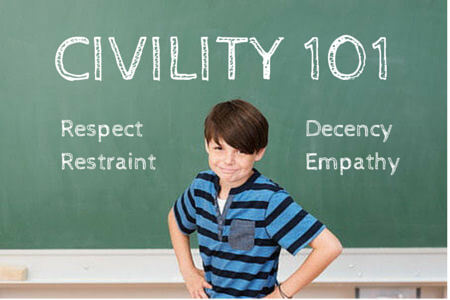We are living in a world where social media sites like Facebook and Twitter make it easier to say things that should be left unsaid. Our ability to contain our emotions in a face-to-face situation has been replaced with the ease of a click, sending out words and expressions that, once sent, can’t be taken back.

Unfortunately, this ability to hurt and disrespect so readily has made it easier to do the same in our everyday life, including our work life. Confrontations at work seem to be on the rise. With the 2020 elections right around the corner, dissenting comments towards another’s political affiliation has replaced good common sense.
In 2016, according to a poll conducted by consultants McKinsey & Co., 62 percent of employees felt they were treated rudely at least once a month. Since this poll began in 1998, rude behavior has been increasing at a rapid pace.
So what happens when we don’t have civility in the workplace?
• Productivity decreases and quality of work is reduced
• One’s self esteem is damaged
• Creativity is stunted
• Call-offs are increased and the desire to quit increases
• Anger increases towards coworkers and the employer
• Clients and customers can be treated poorly, creating loss of revenue
To combat this toxicity in the workplace we — as business leaders, human resource managers, supervisors, and colleagues — should collectively work at creating a climate of civility and respect. How do we do this?

- Think before you act. Know what you want to communicate (intent, message) and how you want to communicate it (medium, tone, body language, timing, setting). Never engage in personal attacks and name calling.
- Hold difficult conversations directly and face to face, not through texts, voicemails or, worse yet, social media
- Always assume the best in people; it’s what you’d like of others to do for you
- Never rely on assumptions, only on the facts; often, miscommunication comes from misunderstanding
- Treat others the way you would want to be treated — with dignity, courtesy and respect
- Know your own “hot buttons.” Self-awareness is key to knowing how best to respond (or even to delaying reacting) so as not to get into a nasty “attack-and-defend” situation
If we all practiced to be more civil to each other, think of what could be accomplished, not only at work, but in our everyday lives. The world is hectic enough without adding “workplace crazy” into the environment. Isn’t it worth the effort?
(written by: Denise)

